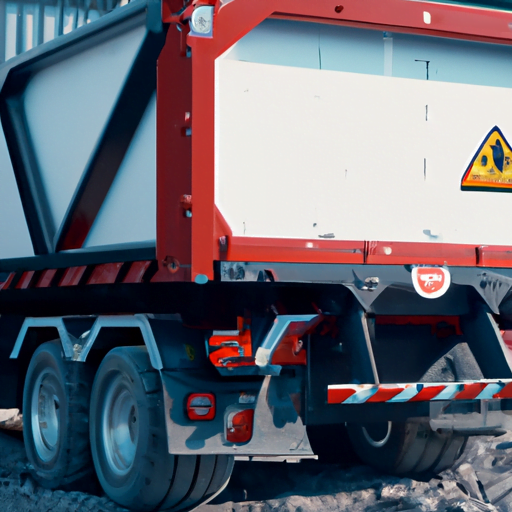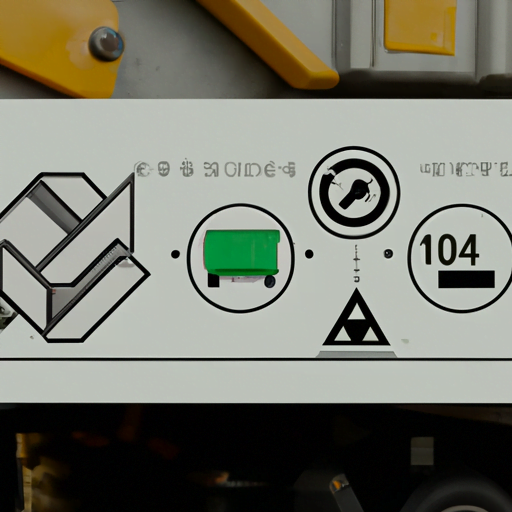-
Table of Contents
Understand the mechanics of dump trailers today! Check out our comprehensive guide on Understanding Dump Trailer Mechanics: A 2023 Guide. Click below
Understand the mechanics of dump trailers today!
Introduction
A 2023 Guide. This guide aims to provide a comprehensive understanding of dump trailer mechanics, including the different types of dump trailers, their components, and how they work. It will also cover the maintenance and safety considerations that come with owning and operating a dump trailer. Whether you are a seasoned professional or a beginner, this guide will help you gain a better understanding of dump trailer mechanics and how to use them effectively.
The Basics of Dump Trailer Mechanics: A Comprehensive Guide for Beginners
Dump trailers are an essential tool for many industries, including construction, agriculture, and landscaping. They are designed to transport and unload heavy materials, such as gravel, sand, and dirt, quickly and efficiently. If you are new to the world of dump trailers, it can be overwhelming to understand the mechanics behind them. In this article, we will provide a comprehensive guide to the basics of dump trailer mechanics.
Firstly, let’s start with the basics. A dump trailer is a type of trailer that has a hydraulic system that allows the trailer bed to be raised and lowered. The trailer bed is attached to the frame of the trailer by a hinge at the rear end. The hydraulic system is powered by a pump that is usually located on the trailer’s tongue. The pump is powered by the trailer’s battery or by the vehicle’s electrical system.
The hydraulic system consists of a hydraulic cylinder, which is attached to the trailer bed and the frame. When the pump is activated, it sends hydraulic fluid to the cylinder, which extends and raises the trailer bed. The trailer bed can be raised to various angles, depending on the amount of material that needs to be unloaded.
Dump trailers come in various sizes and capacities, depending on the intended use. The most common sizes are 10, 12, and 14 feet long. The capacity of the trailer is determined by the weight of the material that it can carry. The weight capacity ranges from 5,000 to 20,000 pounds.
One of the essential components of a dump trailer is the hitch. The hitch is the part of the trailer that attaches to the vehicle that will be towing it. There are several types of hitches, including ball hitches, pintle hitches, and gooseneck hitches. The type of hitch that is used depends on the size and weight of the trailer and the vehicle that will be towing it.
Another critical component of a dump trailer is the brakes. Dump trailers are required to have brakes on all wheels, and the brakes must be able to stop the trailer when it is fully loaded. The brakes are activated by a brake controller that is installed in the towing vehicle. The brake controller sends a signal to the trailer’s brakes when the vehicle’s brakes are applied.
Dump trailers also have safety features, such as safety chains and breakaway systems. Safety chains are attached to the trailer and the towing vehicle to prevent the trailer from separating from the vehicle in the event of a hitch failure. Breakaway systems are designed to activate the trailer’s brakes if it becomes detached from the towing vehicle.
In conclusion, dump trailers are an essential tool for many industries, and understanding their mechanics is crucial for safe and efficient operation. The hydraulic system, hitch, brakes, and safety features are all critical components of a dump trailer. By understanding these basics, you can ensure that you are using your dump trailer safely and effectively.
5 Essential Tips for Maintaining Your Dump Trailer’s Mechanics
Dump trailers are an essential tool for many industries, from construction to agriculture. They are designed to haul and dump heavy loads, making them a valuable asset for any business. However, like any piece of equipment, dump trailers require regular maintenance to ensure they operate efficiently and safely. In this article, we will provide you with five essential tips for maintaining your dump trailer’s mechanics.
- Check the Tires
The first and most crucial step in maintaining your dump trailer is to check the tires regularly. Tires are the only point of contact between the trailer and the road, and they are subjected to a lot of wear and tear. Check the tire pressure and tread depth regularly, and replace any worn or damaged tires immediately. Proper tire maintenance will not only ensure your trailer operates safely but will also extend the life of your tires.
- Inspect the Brakes
The brakes on your dump trailer are critical for safe operation. Regularly inspect the brake system, including the brake pads, rotors, and calipers. If you notice any signs of wear or damage, replace the affected parts immediately. Additionally, ensure that the brake fluid is at the correct level and that there are no leaks in the system.
- Lubricate Moving Parts
Dump trailers have many moving parts, including hinges, pins, and cylinders. These parts require regular lubrication to operate smoothly and prevent wear and tear. Use a high-quality lubricant to lubricate all moving parts, and ensure that the lubricant is applied evenly. Regular lubrication will not only extend the life of your trailer but will also ensure that it operates smoothly and efficiently.
- Clean the Trailer
Dump trailers are often used to haul dirty and heavy loads, which can cause dirt and debris to accumulate on the trailer’s surface. Regularly clean the trailer to remove any dirt, debris, or other contaminants that may cause damage to the trailer’s surface. Use a high-pressure washer to remove any stubborn dirt or debris, and ensure that the trailer is completely dry before storing it.
- Store the Trailer Properly
Proper storage is essential for maintaining your dump trailer’s mechanics. When not in use, store the trailer in a dry, secure location, away from the elements. If possible, store the trailer indoors to protect it from the weather. Additionally, ensure that the trailer is properly secured to prevent it from moving or tipping over.
In conclusion, maintaining your dump trailer’s mechanics is essential for safe and efficient operation. Regularly check the tires, inspect the brakes, lubricate moving parts, clean the trailer, and store it properly to ensure that it operates smoothly and efficiently. By following these essential tips, you can extend the life of your dump trailer and ensure that it remains a valuable asset for your business.
Understanding the Different Types of Dump Trailer Mechanics: Which One is Right for You?
Dump trailers are an essential tool for many industries, including construction, agriculture, and landscaping. They are designed to transport and unload heavy materials, such as gravel, sand, and dirt, quickly and efficiently. However, not all dump trailers are created equal. There are several different types of dump trailer mechanics, each with its own advantages and disadvantages. In this article, we will explore the different types of dump trailer mechanics and help you determine which one is right for you.
The first type of dump trailer mechanics is the hydraulic system. Hydraulic dump trailers use a hydraulic pump to lift the trailer bed and dump the contents. This system is the most common type of dump trailer mechanics and is known for its reliability and ease of use. Hydraulic dump trailers are also relatively inexpensive compared to other types of dump trailers. However, they do require regular maintenance to ensure that the hydraulic system is functioning correctly.
The second type of dump trailer mechanics is the electric system. Electric dump trailers use an electric motor to lift the trailer bed and dump the contents. This system is quieter than hydraulic dump trailers and requires less maintenance. Electric dump trailers are also more environmentally friendly since they do not require hydraulic fluid. However, they are more expensive than hydraulic dump trailers and may not be as reliable in extreme weather conditions.
The third type of dump trailer mechanics is the manual system. Manual dump trailers use a hand crank or lever to lift the trailer bed and dump the contents. This system is the simplest and most affordable type of dump trailer mechanics. Manual dump trailers are also lightweight and easy to maneuver. However, they require physical effort to operate and are not suitable for heavy loads.
The fourth type of dump trailer mechanics is the pneumatic system. Pneumatic dump trailers use compressed air to lift the trailer bed and dump the contents. This system is ideal for hauling materials that are difficult to unload, such as wet sand or clay. Pneumatic dump trailers are also more efficient than hydraulic dump trailers since they require less energy to operate. However, they are more expensive than hydraulic dump trailers and require a specialized air compressor to function.
When choosing a dump trailer, it is essential to consider your specific needs and budget. If you are looking for a reliable and affordable option, a hydraulic dump trailer may be the best choice. If you are concerned about the environment and want a quieter option, an electric dump trailer may be the way to go. If you are looking for a lightweight and easy-to-use option, a manual dump trailer may be the best fit. Finally, if you need to haul difficult-to-unload materials, a pneumatic dump trailer may be the right choice.
In conclusion, understanding the different types of dump trailer mechanics is crucial when choosing the right dump trailer for your needs. Hydraulic, electric, manual, and pneumatic dump trailers all have their advantages and disadvantages. By considering your specific needs and budget, you can choose the dump trailer that is right for you. Whether you are in construction, agriculture, or landscaping, a dump trailer is an essential tool that can help you transport and unload heavy materials quickly and efficiently.
Q&A
- What is a dump trailer?
A dump trailer is a type of trailer that is designed to transport and unload loose materials, such as gravel, sand, or dirt. It has a hydraulic system that allows the trailer bed to be raised and tilted, allowing the contents to be dumped out. - How does a dump trailer work?
A dump trailer works by using a hydraulic system to raise and tilt the trailer bed. The hydraulic system is powered by a pump that is usually located on the trailer itself. When the pump is activated, it sends hydraulic fluid to a cylinder that raises the bed. Once the bed is raised to the desired angle, the hydraulic fluid is released from the cylinder, causing the bed to tilt and the contents to be dumped out. -
What are the benefits of using a dump trailer?
Using a dump trailer can provide several benefits, including increased efficiency and productivity. Dump trailers can transport large quantities of materials quickly and easily, and they can be unloaded quickly and efficiently at the job site. Additionally, dump trailers can help reduce the risk of injury to workers by eliminating the need for manual unloading.
Conclusion
Conclusion: Understanding dump trailer mechanics is crucial for anyone who wants to operate or maintain a dump trailer. This guide provides a comprehensive overview of dump trailer mechanics, including the different types of dump trailers, their components, and how they work. By following the tips and guidelines outlined in this guide, operators can ensure that their dump trailers are safe, efficient, and reliable. With the information provided in this guide, individuals can confidently operate and maintain their dump trailers, ensuring that they are always in top condition and ready for any job.


